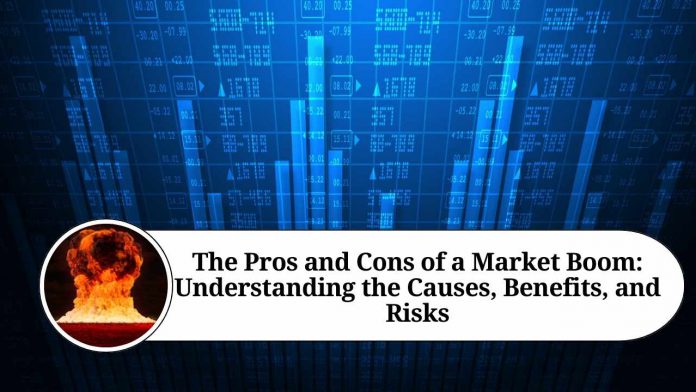A market boom is a phenomenon where the prices of stocks, commodities, and other assets increase rapidly and continuously over some time. It is a state of the economy where investors are optimistic and confident about the prospects of the market, and they are willing to buy assets at higher prices. Market booms are usually associated with strong economic growth, low unemployment, and high consumer confidence.
The causes of a market boom can be various, including changes in government policies, economic indicators, and investor sentiments. For instance, a government’s decision to lower interest rates can stimulate economic growth by encouraging borrowing and investment. This can increase consumer spending and business activity, leading to higher demand for goods and services and driving up asset prices.
Similarly, positive economic indicators such as rising GDP, low inflation, and low unemployment can also lead to a market boom. When people feel optimistic about their financial future, they are more likely to invest in the market, which can further drive up prices.
Investor sentiment plays a crucial role in the market boom as well. When investors are optimistic about the future of the market, they are more willing to buy assets, even at higher prices. This can create a self-fulfilling cycle where the market continues to rise, fueled by positive investor sentiment.
However, a market boom is not always a sign of a healthy economy. It can also be caused by speculative behavior, where investors buy assets solely to sell them later at a higher price. This can lead to a bubble, where asset prices become detached from their underlying value, and a sudden drop in prices can cause significant damage to the economy.
Market booms can have both positive and negative effects on different sectors of the economy. On the one hand, a market boom can increase the value of assets, which can create wealth for investors, leading to increased spending and investment. This, in turn, can stimulate economic growth, create jobs, and raise standards of living.
On the other hand, a market boom can also lead to income inequality, where the benefits of the boom are concentrated among a few wealthy individuals, while others are left behind. It can also lead to overinvestment in certain sectors of the economy, creating bubbles that can burst and cause significant economic damage.
The housing market is a good example of how a market boom can have both positive and negative effects. During a housing market boom, housing prices increased, leading to increased demand for construction materials, jobs in the construction industry, and increased home equity for homeowners. However, a housing market boom can also lead to overbuilding, leading to a surplus of housing that can lead to a housing market crash.
Final Conclusion
In conclusion, a market boom is a complex phenomenon that can have both positive and negative effects on the economy. While it can stimulate economic growth and create wealth, it can also lead to income inequality and overinvestment, which can cause economic damage in the long run. It is important for policymakers to carefully monitor market booms and take appropriate measures to prevent bubbles and ensure sustainable economic growth.
Other Related Blogs: Section 144B Income Tax Act
Frequently Asked Questions
Q: What is a market boom?
A: A market boom is a period of rapid and continuous increase in the prices of stocks, commodities, and other assets. It is often associated with strong economic growth, low unemployment, and high consumer confidence.
Q: What causes a market boom?
A: A market boom can be caused by various factors, including changes in government policies, positive economic indicators, and positive investor sentiment. For example, a government’s decision to lower interest rates can stimulate economic growth, leading to a market boom.
Q: What are the benefits of a market boom?
A: A market boom can create wealth for investors, stimulate economic growth, and create jobs. It can also lead to increased consumer spending and investment, which can further drive economic growth.
Q: What are the risks of a market boom?
A: A market boom can lead to overinvestment and speculative behavior, creating bubbles that can burst and cause significant economic damage. It can also lead to income inequality, where the benefits of the boom are concentrated among a few wealthy individuals, while others are left behind.
Q: How can investors benefit from a market boom?
A: Investors can benefit from a market boom by buying assets that are likely to increase in value, such as stocks or real estate. However, investors need to make informed decisions and avoid speculative behavior that can lead to losses in case of a market downturn.
Q: How can policymakers address the risks of a market boom?
A: Policymakers can monitor market conditions and take appropriate measures to prevent bubbles and ensure sustainable economic growth. For example, they can implement regulations that prevent excessive risk-taking and promote financial stability. They can also adjust monetary and fiscal policies to address imbalances in the economy.




















